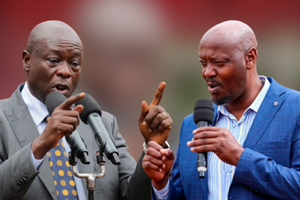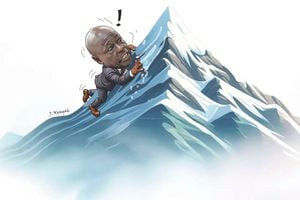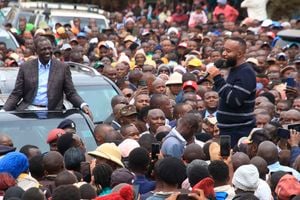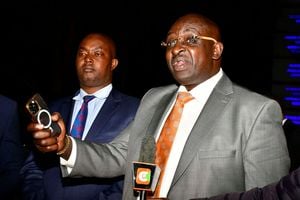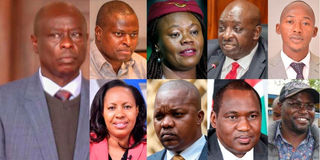
Former Deputy President Rigathi Gachagua (left) and MPs Ndindi Nyoro, Gathoni Wamuchomba, James Gakuya, Vincent Musau, Wanjiku Muhia, Nimrod Mbai, Kareke Mbiuki and Johana Ng'eno.
Molo MP Kuria Kimani will replace his Kiharu colleague Ndindi Nyoro, as the chairman of the powerful Budget and Appropriations Committee in sweeping National Assembly midterm committee leadership changes, Nation has learnt.
While the changes are being explained as routine mid-term shakeup, sources say they are informed by recent political developments, including the impeachment of Mr Rigathi Gachagua as Deputy President (DP) and co-opting of opposition leader Raila Odinga’s members in Cabinet.
The purge scheduled for this week also affects 13 other MPs serving in influential committee leadership positions, who are viewed as sympathetic to Mr Gachagua who was ousted last month and replaced with Prof Kindiki Kithure as DP.
Sources say the changes will also see some ODM MPs co-opted to the committee leadership positions, notably the Finance and National Planning Committee, which is currently led by Mr Kimani.
Usually, such changes are deliberated on and a binding resolution reached during a Parliamentary Group (PG) meeting to inform debate and voting in the House.
But it is not clear when and whether the PG will be held or the matter will be left to the canvassing of the leader of majority and the whips, as no PG has been scheduled this week.
President William Ruto will deliver a State of the Nation address to Parliament on Thursday.
Mr Kimani, the youthful Molo MP, rose to the political limelight when he was elected to chair the crucial Finance and National Planning committee, that is in charge of spearheading the national government’s tax policy and legislative agenda.
Personal interest
Sources within President Ruto’s Kenya Kwanza administration say that the President has taken “a personal interest in the Molo MP, owing to his commitment to push the government agenda in the House specifically related to the budget financing.”
“The President likes courageous and decisive leaders. The troubles that Mr Kimani encountered while pushing for the government’s legislative agenda in matters tax that saw some of his property razed, endeared him more to the president,” said an MP, who spoke in confidence referring to the public protests that forced the withdrawal of the Finance Bill, 2024, which had a raft of unpopular taxes.
Mr Nyoro had been considered President Ruto’s “very close” ally immediately the Kenya Kwanza administration assumed power, which saw his name mentioned among those likely to be the President’s running mate in the 2027 General Election.
However, he appears to have fallen out with the powers after he failed to take a position on the impeachment of Mr Gachagua.
“This was Mr Nyoro’s main undoing. He chose to keep quiet at a time he was needed most, leaving the president exposed,” says the MP, who noted that he may not be left empty-handed and that he might be given a leadership position in a less influential committee.
Leader of Majority Kimani Ichung’wah (Kikuyu), who also chairs the Committee on Selection that constitutes membership of committees, was not available for comment on the impending leadership changes.
Mr Ichung’wah has, however, been vocal that a shakeup of leadership of committees was imminent.
“You will be impeached if as a committee chairperson, you don’t attend House sittings,” said Mr Ichung’wah while alluding to the numerous quorum hitches, noting that the more than 60 committee chairpersons and their deputies are enough for the House to constitute a quorum.
“If you are a chairperson or vice chairperson of a House Committee, you must be present in the House every time,” Mr Ichung’wah said in the House last week.
“There is no reason for the Speaker to be left waiting for the quorum bell while members, especially those responsible for leading discussions and responding to questions, are absent,” he added.
Mr Nyoro is among MPs who skipped the House sitting on October 8, as members voted on the motion to impeach Mr Gachagua.
The Budget committee plays a critical role in approving budgetary allocations to various government Ministries, Departments and Agencies (MDAs).
Other than Mr Nyoro, the other committee chairs targeted in the looming purge include the vocal Githunguri MP Gathoni Wamuchomba (Constitutional Implementation and Oversight Committee), Ndia MP George Kariuki (Transport and Infrastructure) and Embakasi North MP James Gakuya (Trade, Industry and Cooperatives).
Emurua Dikir MP Johanna Ngeno (Housing, Urban Development and Public Works), Mwala MP Vincent Musyoka (Energy), Kipipiri MP Wanjiku Muhia (Regional Integration), Kitui East MP Nimrod Mbai (Public Petitions) and Maara MP Kareke Mbiuki (Tourism and Wildlife) are also targeted.
Kimilili MP Didmus Barasa, the vice chairperson of the Transport and Infrastructure committee, was categorical that changes including reorganisation of committees “is inevitable especially when the House is in midterm.”
“The broad-based government that we have must be reflected within the leadership of the House committees. This is one of the reasons that the committees will be reorganised,” Mr Barasa said.
The committees on budget, energy, transport, housing and trade are some of the most sought-after by members ordinarily at the start of the first session of the House, usually after a General Election.
The Kimilili MP revealed that the planned reorganisation of the House committees was informed by the recently concluded National Assembly leadership retreat in Naivasha “that assessed performance of among others, committees.”
“It has been two years now and the House hasn’t reorganised its committees. As part of reengineering the National Assembly to ensure that it delivers services to the people, this change is necessary and as a House, we will support it regardless of the likelihood of casualties,” the Kimilili MP said.
Ms Wamuchomba fell out with President Ruto’s administration in the first year of assuming power and has consistently been critical of its policies. For that, she has been a marked person.
Opposed impeachment
Like Ms Muhia, Ms Wamuchomba was among those who opposed the impeachment of Mr Gachagua.
Mr Gakuya also defended the impeached DP and has on numerous occasions clashed with the authorities leading to his arrest.
The Ndia MP has been accused of absenteeism despite chairing a critical committee of the House. At some point, committee members collected signatures to remove him mid this year but were prevailed upon by Mr Ichung’wah to drop the idea.
Standing Order 178 of the National Assembly Standing Orders, provides guidance on the leadership of the House Committees for instance, departmental committees elect their chairpersons and vice chairpersons from among their respective members.
This means that any member of the respective departmental committee whether from a parliamentary party forming the government or not, can chair or deputise the committees.
However, the Standing Order is specific on who chairs or deputises the Public Accounts Committee (PAC), the Public Investments Committees (PICs) and the Committee on Implementation (CoI).
The Standing Order states that members of PAC, PICs and Special Fund Accounts Committee (SFAC) shall elect a chairperson and vice-chairperson from amongst the members of the committees from a party other than a parliamentary party forming the national government.
It goes on to state that the members of the SFAC shall elect a chairperson and vice-chairperson from amongst independent members nominated to the committee or the members of the committee nominated from a party other than a parliamentary party forming the national government. This is if there are no independent members in the House.

